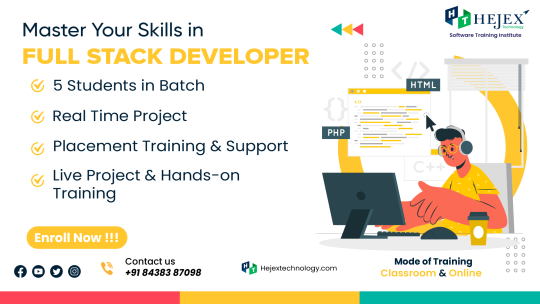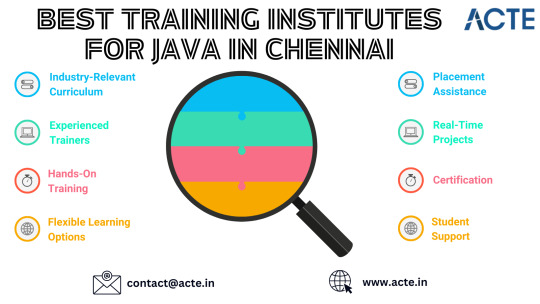#Java Spring Training In Chennai
Explore tagged Tumblr posts
Text
Best Software Development Company in Chennai | Top Software Experts

In the competitive world of technology, finding the best software development company in Chennai can be the difference between a project that merely functions and one that truly excels. Whether you’re a startup looking to build an MVP or an established enterprise aiming for digital transformation, partnering with a top-tier Software Development Company in Chennai ensures access to seasoned expertise, cost-efficient processes, and cutting-edge solutions.
Why Chennai Is a Premier Destination for Software Development
Exceptional Talent Pool Chennai’s renowned engineering colleges and IT training institutes produce thousands of skilled developers each year. This abundance of talent means that the best software development company in Chennai has no shortage of experts in Java, .NET, Python, JavaScript frameworks (React, Angular, Vue), and mobile technologies (iOS, Android, Flutter).
Cost-Effective Engagement Models Compared to Western markets, Chennai-based firms offer highly competitive rates without compromising quality. Flexible engagement models—fixed-price, time-and-materials, or dedicated teams—allow you to scale resources up or down, making them ideal for projects of any size.
Mature Delivery Processes Leading Software Development Company in Chennai utilize Agile and DevOps practices to streamline development cycles, reduce time-to-market, and ensure continuous delivery. With clear sprints, transparent communication channels, and iterative feedback loops, they keep your project on track and within budget.
Key Characteristics of the Best Software Development Company in Chennai
1. Comprehensive Service Portfolio
A top-rated software development company in Chennai offers end-to-end services, including:
Consulting & Requirements Analysis: Defining scope, identifying user stories, and planning architecture
UX/UI Design: Crafting intuitive, responsive interfaces based on user-centered design principles
Custom Development: Building scalable backends, dynamic frontends, and secure APIs
Quality Assurance & Testing: Automated and manual testing to guarantee bug-free delivery
Maintenance & Support: Ongoing monitoring, performance tuning, and feature enhancements
2. Domain Expertise
The best software development company in Chennai often specializes in verticals such as:
E-commerce & Retail: High-volume transaction systems, secure payment gateways
Healthcare & Life Sciences: HIPAA-compliant platforms, telemedicine applications
Finance & FinTech: Real-time data processing, blockchain integration
Education & EdTech: Learning management systems, adaptive learning solutions
3. Technology & Tools
Look for a Software Development Company in Chennai that embraces modern stacks and tools:
Frontend: React.js, Angular, Vue.js
Backend: Node.js, Django, Spring Boot, .NET Core
Mobile: Swift, Kotlin, Flutter, React Native
DevOps: Docker, Kubernetes, Jenkins, AWS/Azure/GCP
How to Evaluate and Choose Your Partner
Portfolio & Case Studies Review real-world examples: successful launches, performance benchmarks, and client testimonials. A reputable software development company in Chennai will showcase measurable outcomes—reduced load times, increased user engagement, or accelerated release cycles.
Client References & Reviews Platforms like Clutch.co and GoodFirms feature verified feedback on budget adherence, communication, and technical expertise. Look for consistently high ratings in “on-time delivery” and “post-launch support.”
Communication & Cultural Fit Time-zone compatibility, English proficiency, and project-management tools (e.g., Jira, Trello, Slack) are critical for seamless collaboration. The best software development company in Chennai will offer dedicated account managers and regular status updates.
Security & Compliance Ensure they follow industry-standard security protocols (OWASP, ISO 27001) and are familiar with regulatory requirements relevant to your domain (GDPR, HIPAA, PCI DSS).
Success Stories: What Sets Them Apart
Rapid MVP Delivery: A fintech startup partnered with a Chennai firm to launch a beta in 8 weeks—validating demand and securing seed funding.
Scalable Architecture: An e-commerce brand scaled from 10,000 to 100,000 monthly active users without downtime, thanks to microservices and cloud-native deployment.
Continuous Improvement: A healthcare platform reduced average bug resolution time by 60% through automated CI/CD pipelines and proactive monitoring.
Conclusion
Choosing the best software development company in Chennai means more than just hiring coders—it’s about engaging strategic partners who understand your business, leverage advanced technologies, and deliver solutions that drive real ROI. By focusing on proven expertise, robust processes, and transparent communication, you’ll empower your organization to innovate, compete, and thrive in today’s digital economy.
0 notes
Text

Master Full Stack Development at Hejex Technology – Chennai's Premier Training Institute!
Looking to become a proficient Full Stack Developer? Join Hejex Technology in Chennai for a comprehensive training program designed to equip you with both front-end and back-end development skills. With 10+ live projects and 100% job assistance, you'll be well-prepared to tackle real-world challenges and secure your place in the tech industry.
Why Choose Hejex Technology?
Personalized Attention: Only 5 students per batch to ensure focused learning.
Practical Exposure: Engage in 50+ tasks and 3+ real-time projects.
Expert Guidance: Learn from industry professionals with real-world experience.
Flexible Learning: Options for both classroom and online formats.
Career Support: Comprehensive placement assistance to help you land your dream job.
Hejex Technology Course Highlights:
Front-End Development: HTML5, CSS3, Bootstrap, JavaScript, React JS, Angular.
Back-End Development: Java, Spring Boot, Python, Django. Database Management: MySQL, MongoDB. Version Control: GitHub. API Integration: REST API.
Locations: Conveniently situated in Pallavaram and Tambaram, Chennai. Full Stack Developer Course in Chennai
0 notes
Text

Elevate your skills with the Best Spring Boot Training Classes In Chennai led by experienced professionals. These classes offer comprehensive coverage of Spring Boot, focusing on practical applications like creating RESTful APIs, implementing microservices, and ensuring security. With real-world projects and personalized mentorship, you’ll gain the confidence to tackle complex development tasks. Start your journey towards becoming a Spring Boot expert by enrolling in the Best Spring Boot Training Classes In Chennai today.
#Best Spring Boot Training Classes In Chennai#education#Best Spring Tutorial#Java Framework Courses#Spring Boot Training Classes
0 notes
Text
A Guide to Creating APIs for Web Applications

APIs (Application Programming Interfaces) are the backbone of modern web applications, enabling communication between frontend and backend systems, third-party services, and databases. In this guide, we’ll explore how to create APIs, best practices, and tools to use.
1. Understanding APIs in Web Applications
An API allows different software applications to communicate using defined rules. Web APIs specifically enable interaction between a client (frontend) and a server (backend) using protocols like REST, GraphQL, or gRPC.
Types of APIs
RESTful APIs — Uses HTTP methods (GET, POST, PUT, DELETE) to perform operations on resources.
GraphQL APIs — Allows clients to request only the data they need, reducing over-fetching.
gRPC APIs — Uses protocol buffers for high-performance communication, suitable for microservices.
2. Setting Up a REST API: Step-by-Step
Step 1: Choose a Framework
Node.js (Express.js) — Lightweight and popular for JavaScript applications.
Python (Flask/Django) — Flask is simple, while Django provides built-in features.
Java (Spring Boot) — Enterprise-level framework for Java-based APIs.
Step 2: Create a Basic API
Here’s an example of a simple REST API using Express.js (Node.js):javascriptconst express = require('express'); const app = express(); app.use(express.json());let users = [{ id: 1, name: "John Doe" }];app.get('/users', (req, res) => { res.json(users); });app.post('/users', (req, res) => { const user = { id: users.length + 1, name: req.body.name }; users.push(user); res.status(201).json(user); });app.listen(3000, () => console.log('API running on port 3000'));
Step 3: Connect to a Database
APIs often need a database to store and retrieve data. Popular databases include:
SQL Databases (PostgreSQL, MySQL) — Structured data storage.
NoSQL Databases (MongoDB, Firebase) — Unstructured or flexible data storage.
Example of integrating MongoDB using Mongoose in Node.js:javascriptconst mongoose = require('mongoose'); mongoose.connect('mongodb://localhost:27017/mydb', { useNewUrlParser: true, useUnifiedTopology: true });const UserSchema = new mongoose.Schema({ name: String }); const User = mongoose.model('User', UserSchema);app.post('/users', async (req, res) => { const user = new User({ name: req.body.name }); await user.save(); res.status(201).json(user); });
3. Best Practices for API Development
🔹 Use Proper HTTP Methods:
GET – Retrieve data
POST – Create new data
PUT/PATCH – Update existing data
DELETE – Remove data
🔹 Implement Authentication & Authorization
Use JWT (JSON Web Token) or OAuth for securing APIs.
Example of JWT authentication in Express.js:
javascript
const jwt = require('jsonwebtoken'); const token = jwt.sign({ userId: 1 }, 'secretKey', { expiresIn: '1h' });
🔹 Handle Errors Gracefully
Return appropriate status codes (400 for bad requests, 404 for not found, 500 for server errors).
Example:
javascript
app.use((err, req, res, next) => { res.status(500).json({ error: err.message }); });
🔹 Use API Documentation Tools
Swagger or Postman to document and test APIs.
4. Deploying Your API
Once your API is built, deploy it using:
Cloud Platforms: AWS (Lambda, EC2), Google Cloud, Azure.
Serverless Functions: AWS Lambda, Vercel, Firebase Functions.
Containerization: Deploy APIs using Docker and Kubernetes.
Example: Deploying with DockerdockerfileFROM node:14 WORKDIR /app COPY package.json ./ RUN npm install COPY . . CMD ["node", "server.js"] EXPOSE 3000
5. API Testing and Monitoring
Use Postman or Insomnia for testing API requests.
Monitor API Performance with tools like Prometheus, New Relic, or Datadog.
Final Thoughts
Creating APIs for web applications involves careful planning, development, and deployment. Following best practices ensures security, scalability, and efficiency.
WEBSITE: https://www.ficusoft.in/python-training-in-chennai/
0 notes
Text
Advance Java training course duration in chennai
Enroll in the Advanced Java Training Course in Chennai and elevate your programming skills! This comprehensive course covers JDBC, Servlets, JSP, Spring, and Hibernate. With a duration of 45 to 60 days, flexible weekday and weekend batches are available. Get hands-on experience with real-time projects guided by industry experts. Perfect for students and professionals aiming for a career in enterprise application development. Start your Java journey today in Chennai!
0 notes
Text
advance java training
Advance Java Training – Upgrade Your Skills for a Better Career
Advance Java Training is essential for students and professionals aiming to build a strong career in web and enterprise applications. Unlike core Java, which focuses on basic concepts, Advance Java dives deep into powerful technologies like JDBC, Servlets, JSP, and frameworks such as Spring and Hibernate. This course is perfect for those who want to develop complex, secure, and dynamic applications. Many training institutes in Chennai offer Advance Java courses with hands-on projects, real-time examples, and placement support. Whether you're a student, fresher, or working professional, enrolling in an Advance Java training program can help you get job-ready for roles in software development, backend engineering, or full-stack development. Choose a Centre that offers free placement guidance, expert trainers, and practical labs. With demand for Java developers on the rise, mastering Advance Java gives you a competitive edge in the IT industry. More more details
0 notes
Text
How to Build REST APIs with Java and Spring Boot

How to Build REST APIs with Java and Spring Boot
Spring Boot is one of the most popular frameworks for building RESTful APIs in Java. It simplifies the development process by providing pre-configured settings, embedded servers, and minimal boilerplate code. Below is a structured guide to help you build REST APIs using Java and Spring Boot.
1. Set Up Your Spring Boot Project
You can set up a Spring Boot project using Spring Initializr:
Select Spring Boot Version (latest stable version)
Choose Project: Maven or Gradle
Select Language: Java
Add Dependencies:
Spring Web (for REST APIs)
Spring Boot DevTools (for development convenience)
Lombok (for reducing boilerplate code)
Spring Data JPA (if using a database)
H2/MySQL/PostgreSQL (database choice)
Download the project, extract it, and open it in your preferred IDE (IntelliJ IDEA, Eclipse, or VS Code).
2. Create the Main Application Class
The entry point of a Spring Boot application is the @SpringBootApplication-annotated class.javapackage com.example.restapi;import org.springframework.boot.SpringApplication; import org.springframework.boot.autoconfigure.SpringBootApplication;@SpringBootApplication public class RestApiApplication { public static void main(String[] args) { SpringApplication.run(RestApiApplication.class, args); } }
3. Create a Model Class
The model represents the data structure.java package com.example.restapi.model;import lombok.AllArgsConstructor; import lombok.Data; import lombok.NoArgsConstructor;@Data @AllArgsConstructor @NoArgsConstructor public class Employee { private Long id; private String name; private String department; }
4. Create a REST Controller
Spring Boot uses the @RestController annotation to create API endpoints.package com.example.restapi.controller;import com.example.restapi.model.Employee; import org.springframework.web.bind.annotation.*;import java.util.ArrayList; import java.util.List;@RestController @RequestMapping("/employees") public class EmployeeController { private List<Employee> employees = new ArrayList<>(); @GetMapping public List<Employee> getAllEmployees() { return employees; } @PostMapping public Employee addEmployee(@RequestBody Employee employee) { employees.add(employee); return employee; } @GetMapping("/{id}") public Employee getEmployeeById(@PathVariable Long id) { return employees.stream() .filter(emp -> emp.getId().equals(id)) .findFirst() .orElse(null); } @DeleteMapping("/{id}") public String deleteEmployee(@PathVariable Long id) { employees.removeIf(emp -> emp.getId().equals(id)); return "Employee removed."; } }
5. Run and Test the API
Start the application by running the RestApiApplication.java class. You can test the API using Postman or cURL.
GET all employees: GET http://localhost:8080/employees
POST a new employee: POST http://localhost:8080/employees
Request Body (JSON):
json
{ "id": 1, "name": "John Doe", "department": "IT" }
GET employee by ID: GET http://localhost:8080/employees/1
DELETE an employee: DELETE http://localhost:8080/employees/1
6. Enhancements
To make the API more robust:
Use a database with JPA and Hibernate
Implement error handling using @ExceptionHandler
Add validation with @Valid
Secure the API with Spring Security and JWT
Document the API with Swagger
WEBSITE: https://www.ficusoft.in/core-java-training-in-chennai/
0 notes
Text
Why Java is Essential for Software Development
In the ever-evolving landscape of software development, choosing the right programming language can significantly impact the success of a project. Among the many options available, Java has emerged as a foundational language that continues to play a vital role in the industry. Enrolling in a Java Course in Chennai significantly enhances one’s ability to leverage Java’s capabilities effectively. Understanding its primary advantages is crucial for developers and businesses considering its adoption.

Here’s an exploration of why Java is essential for software development and why it remains a preferred choice for developers worldwide.
1. Platform Independence
One of Java's standout features is its platform independence, encapsulated in the mantra "write once, run anywhere" (WORA). This means that Java applications can run on any device that has a Java Virtual Machine (JVM). This versatility is a significant advantage for developers, as they can create applications that are not tied to a specific operating system, thus broadening their reach and potential user base.
2. Robustness and Reliability
Java is designed with a focus on reliability. Its strong memory management, exception handling, and garbage collection mechanisms reduce the chances of memory leaks and application crashes. This robustness is critical in enterprise-level applications where stability and performance are paramount. The language's strong typing system also helps developers catch errors early in the development process, leading to more reliable software.
3. Rich Ecosystem and Libraries
Java boasts a vast ecosystem of libraries and frameworks that streamline the development process. Libraries such as Spring and Hibernate provide pre-built functionality for common tasks, allowing developers to focus on writing unique features for their applications. Additionally, Java has extensive support for building web applications, mobile apps, and enterprise solutions, making it a versatile choice for any software project.
4. Strong Community Support
With a long history in the programming world, Java has cultivated a large and active community of developers. This community contributes to a wealth of resources, including forums, documentation, and online courses, which are invaluable for both beginners and experienced developers. The collaborative nature of the Java community fosters continuous improvement and innovation, ensuring that the language remains relevant and up-to-date with industry trends. Consider enrolling in the Java Online Certification Training to fully harness Java’s capabilities and become proficient in web automation.

5. Scalability
Java's architecture supports scalability, making it an ideal choice for businesses of all sizes. Whether developing a small application or a large enterprise system, Java can handle increased loads seamlessly. This scalability is particularly important for organizations anticipating growth, as it allows them to expand their applications without having to switch programming languages.
6. Security Features
Java offers a robust set of security features, which is crucial in today’s environment where data breaches and cyber threats are prevalent. With built-in security mechanisms such as bytecode verification and the Java Security Manager, developers can create secure applications that protect sensitive information. This emphasis on security makes Java a popular choice for financial institutions, healthcare providers, and other sectors that handle sensitive data.
7. Integration Capabilities
Java easily integrates with other languages and technologies, making it an ideal choice for software development projects that require collaboration across different platforms. This capability is particularly useful in microservices architectures, where different components may be written in various programming languages. Java's ability to interact with other technologies helps streamline development processes and fosters innovation.
8. Career Opportunities
With its enduring popularity, Java skills remain in high demand in the job market. Many companies seek developers proficient in Java for various roles, from web development to enterprise application development. By mastering Java, you position yourself favorably for numerous job opportunities, making it a valuable investment in your career.
Conclusion
Java’s longevity and continued relevance in the software development landscape can be attributed to its platform independence, robustness, extensive libraries, strong community support, scalability, security features, integration capabilities, and ample career opportunities. For anyone looking to make their mark in software development, mastering Java is not just beneficial—it's essential. Embracing Java can pave the way for creating innovative applications that meet the evolving needs of users and businesses alike. Whether you’re a beginner or a seasoned developer, investing time in learning Java will undoubtedly pay off in the long run.
0 notes
Text
Best Spring Boot Courses in Chennai for Java Mastery
Why Spring Boot?
Spring Boot simplifies complex enterprise Java applications, offering faster development cycles, out-of-the-box tools, and seamless integration with other popular frameworks. Companies such as Netflix, Amazon, and Google rely heavily on Spring Boot to deliver highly scalable services, adding to its global demand. The software's popularity is reflected in the job market. According to LinkedIn, Chennai alone had over 3,000 job postings in the last year that required Spring Boot expertise, highlighting the growing need for Java developers with this specialization.
This is where Login 360’s Spring Boot courses come into play. Tailored to meet the needs of both beginners and seasoned professionals, the curriculum offers a deep dive into Spring Boot’s architecture, development best practices, and hands-on projects. The courses are designed for IT students looking to sharpen their skills or enter the workforce with a strong foundation in Spring Boot.
Comprehensive Course Structure
At Login 360, students receive a robust, well-rounded education in Spring Boot, making them proficient in building complex web applications and micro services. The course covers the following key aspects:
Spring Boot Basics: Introduction to Spring Boot, dependencies, and project setup.
Micro services Architecture: Students learn to design scalable micro services using Spring Boot, which is essential for modern enterprise applications.
Spring Security: Securing web applications is critical, and this module covers authentication, authorization, and implementing security protocols.
Database Integration: The course provides hands-on training in connecting Spring Boot applications to various databases using Spring Data JPA.
This hands-on approach sets Login 360 apart from other training institutes. According to a survey by NASSCOM, over 75% of IT students in India prefer practical training over theoretical learning, which is precisely what this course offers. With over 60 hours of in-depth projects and real-world case studies, students gain practical experience they can immediately apply in their professional careers.
Expert Faculty and Personalized Support
One of the standout features of Login 360’s Spring Boot course is the expertise of its faculty. Each instructor comes with years of industry experience, ensuring students receive mentorship from professionals who are well-versed in current industry standards. This is crucial for students who wish to understand not just theoretical concepts but also how to apply them in a real-world setting. Additionally, Login 360 offers personalized support through one-on-one sessions, allowing students to clear doubts and refine their projects, something rarely offered by other institutes.
Job Placement and Career Growth
Login 360’s commitment to student success extends beyond education. With a 90% placement rate, Login 360 is trusted by top IT companies in Chennai and across India. The placement cell works closely with students, offering resume-building sessions, mock interviews, and direct recruitment opportunities. This holistic approach ensures that students not only learn Spring Boot but also secure positions in companies that use this framework extensively.
Why Choose Login 360?
In Chennai’s competitive IT landscape, choosing the right training institute can be the difference between success and stagnation. Login 360’s comprehensive Spring Boot courses, experienced faculty, and commitment to practical learning make it the best choice for students aiming for Java mastery. Whether you're an aspiring Java developer or an experienced programmer looking to upgrade your skills, Login 360 offers the best path to mastering Spring Boot.
Conclusion
For IT students in Chennai, mastering Spring Boot is not just an option; it’s a necessity. As the demand for skilled Java developers continues to rise, enrolling in Login 360’s Spring Boot courses is the ideal way to fast-track your career. With hands-on training, expert guidance, and excellent placement opportunities, this course equips students to excel in the competitive world of software development.
https://login360.in/best-spring-boot-training-classes-in-chennai/https://login360.in/java-training-in-chennai/
0 notes
Text
Top 10 Java Libraries and Frameworks Every Developer Should Know

Top 10 Java Libraries and Frameworks Every Developer Should Know
1. Spring Framework
Comprehensive ecosystem for enterprise Java development — Dependency injection — MVC architecture — Microservices support
2. Hibernate
Object-relational mapping (ORM) library — Simplifies database interactions — Supports multiple databases — Reduces boilerplate database code
3. Apache Maven
Project management and build automation tool — Dependency management — Standardized project structure — Easy integration with CI/CD pipelines
4. JUnit
—
Unit testing framework — Supports test-driven development — Annotations for test configuration — Wide IDE integration
5. Apache Spark — Big data processing framework — Distributed computing — Machine learning capabilities — Real-time data streaming
6. Mockito — Mocking framework for unit tests — Allows creation of test doubles — Verifies method interactions — Simplifies complex testing scenarios
7. Lombok — Reduces boilerplate code — Automatic getter/setter generation — @Data, @Builder annotations — Improves code readability
8. Jackson — JSON processing library — Object serialization/deserialization — High-performance JSON parsing — Supports complex object mappings
9. Log4j — Logging framework — Configurable logging levels — Performance optimization — Multiple output destinations
10. Guava — Google’s core libraries — Utility classes — Functional programming support — Improved collections and caching
WEBSITE: https://www.ficusoft.in/core-java-training-in-chennai/
0 notes
Text
What Does It Take to Become a Full Stack Developer in 2025?
The tech industry continues to evolve rapidly, and the role of a full stack developer remains one of the most sought-after in 2025. With the increasing demand for professionals who can navigate both the frontend and backend of web development, understanding what it takes to excel in this field has never been more critical.
Understanding the Full Stack Developer Role
A full stack developer is a tech generalist who works on both the client side (frontend) and server side (backend) of applications. They bring together design, coding, and database management skills to create seamless digital experiences.
In 2025, companies are looking for developers who can:
Build responsive and intuitive user interfaces.
Create scalable and secure backend systems.
Collaborate effectively with cross-functional teams.
Stay updated on emerging technologies and frameworks.
Key Skills and Technologies
To become a successful full stack developer in 2025, you need proficiency in:
Frontend Technologies:
HTML, CSS, and JavaScript: The foundational languages of web development.
Frontend Frameworks/Libraries: React, Angular, and Vue.js continue to dominate.
Responsive Design: Mastering tools like Bootstrap or Tailwind CSS to ensure mobile-first designs.
Backend Technologies:
Programming Languages: Node.js, Python, Ruby, Java, and PHP.
Frameworks: Express.js, Django, Ruby on Rails, and Spring.
APIs: Experience with RESTful and GraphQL APIs.
Databases and Storage:
SQL databases like MySQL and PostgreSQL.
NoSQL databases like MongoDB.
Cloud storage solutions like AWS S3 or Google Cloud Storage.
DevOps and Deployment:
Familiarity with Docker, Kubernetes, and CI/CD pipelines.
Cloud platforms such as AWS, Azure, or Google Cloud.
Soft Skills:
Strong problem-solving abilities.
Effective communication and collaboration.
Adaptability to new technologies and workflows.
Steps to Becoming a Full Stack Developer
Learn the Basics: Start with HTML, CSS, and JavaScript. Understand how websites are structured and styled.
Pick a Frontend Framework: Dive into React, Angular, or Vue.js to build dynamic user interfaces.
Master Backend Development: Learn server-side programming languages and frameworks. Practice building APIs.
Understand Databases: Learn how to design, query, and manage databases effectively.
Explore Deployment: Get hands-on experience with deploying applications using cloud platforms.
Build Projects: Create real-world projects to showcase your skills. A portfolio speaks louder than a resume.
Stay Updated: Follow industry trends, join developer communities, and continue learning.
Challenges and How to Overcome Them
Keeping Up with Rapid Changes: Technology evolves quickly. Dedicate time weekly to learn and experiment with new tools.
Balancing Frontend and Backend: Allocate practice time equally between both areas to maintain a well-rounded skill set.
Imposter Syndrome: Remember, every developer started somewhere. Celebrate your progress and keep improving.
The Future of Full Stack Development
In 2025, full stack developers are pivotal in shaping digital transformation. From AI-driven applications to immersive web experiences, the opportunities are vast. Companies value developers who can think holistically and bridge the gap between design and functionality.
By acquiring the right skills, staying adaptable, and building meaningful projects, you can carve a successful career as a full stack developer in 2025. The journey requires dedication, but the rewards—from job satisfaction to competitive salaries—make it worthwhile.
Fullstack course in chennai
Fullstack developer course in chennai
Fullstack training in chennai

0 notes
Text
Which language is the future of web development?
The future of web development likely won't be dominated by a single language but rather a combination of several technologies, each excelling in different areas. However, some languages and frameworks are poised to be particularly influential:
JavaScript (and TypeScript):
JavaScript continues to be the cornerstone of web development, especially for front-end development. It's the only language that runs natively in the browser.
TypeScript, a superset of JavaScript, is gaining popularity for its strong typing and other features that enhance JavaScript's scalability and maintainability.
Python:
Python's simplicity and readability make it a popular choice for backend development. Frameworks like Django and Flask are widely used for building web applications.
Rust:
Rust is emerging as a powerful language for web development due to its performance and safety. Projects like WebAssembly (Wasm) and frameworks like Rocket are increasing Rust's relevance in the web development space.
Go:
Go (or Golang) is known for its efficiency and performance, particularly in handling concurrent tasks. It's used by companies like Google for building scalable web services.
Java:
Java remains a strong player for enterprise-level backend development. Frameworks like Spring continue to be widely used.
Kotlin:
Kotlin is gaining traction as an alternative to Java, especially for Android development, and it's starting to be used more for backend development as well.
PHP:
Despite being one of the older languages, PHP is still heavily used, particularly with content management systems like WordPress and frameworks like Laravel.
Ruby:
Ruby, with its framework Ruby on Rails, remains a strong choice for rapid application development and startups.
Trends and Technologies:
WebAssembly (Wasm): This binary instruction format allows code written in different languages (like Rust, C++, and Go) to run on the web at near-native speed.
Single Page Applications (SPAs): Frameworks like React, Angular, and Vue.js are leading the way in creating more dynamic and responsive user experiences.
Static Site Generators: Tools like Gatsby (React-based) and Next.js (also React-based) are simplifying the process of building static websites with dynamic content.
Serverless Architecture: Services like AWS Lambda, Google Cloud Functions, and Azure Functions are making it easier to build and deploy scalable web applications without managing server infrastructure.
The future of web development will likely be shaped by how these languages and technologies evolve and how well they integrate with each other to meet the demands of developers and users.
software training course in chennai
Best software training course in chennai
Full stack training course in chennai
1 note
·
View note
Text
full stack developer course in chennai
Is Advanced Java training good for a full stack developer? Advanced Java training can certainly be beneficial for a full-stack developer, depending on the specific technologies and frameworks they are working with. Here are a few reasons why:
Understanding Core Java Concepts: Advanced Java training often covers topics such as multithreading, networking, JDBC (Java Database Connectivity), and advanced data structures. These are fundamental concepts that are useful for building robust backend systems in Java, which are often part of full-stack applications.
Enterprise Java Technologies: Advanced Java courses typically cover enterprise-level technologies such as JSP (JavaServer Pages), Servlets, EJB (Enterprise JavaBeans), and JPA (Java Persistence API). These technologies are commonly used in backend development, particularly in enterprise-level applications.
Spring Framework: Many advanced Java courses also include training on the Spring Framework, which is widely used in enterprise Java development for building scalable and maintainable applications. Knowledge of Spring can be extremely valuable for full-stack developers, as it provides comprehensive support for building both backend and frontend components.
Integration with Frontend Technologies: Full-stack developers often need to work with frontend technologies such as JavaScript frameworks (e.g., React, Angular, Vue.js). While Advanced Java training may not directly cover these technologies, it can provide a strong foundation for backend development, which complements frontend skills.
Career Growth: Having a strong understanding of advanced Java concepts and technologies can open up new career opportunities for full-stack developers, particularly in industries that rely heavily on Java-based backend systems, such as finance, healthcare, and enterprise software.
However, it's essential to keep in mind that the relevance of Advanced Java training may vary depending on the specific requirements of the projects you're working on and the technologies used in your organization. It's always a good idea to assess your own skill gaps and career goals before investing time and resources into any training program.
java full stack developer course in chennai
python full stack developer course in chennai
full stack course in chennai
full stack developer course chennai

0 notes